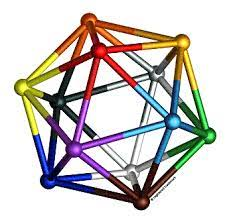Seymour Papert argued that we do not have a word for the art of learning in the same way that we have words for the art of teaching (pedagogy, didactics) (see his "A word for learning": http://ccl.northwestern.edu/constructionism/2012LS452/assignments/2/wordforlearning.9-24.pdf). Papert then suggests the word "mathetics", drawing attention to the fact that "mathematics" appropriated the word for learning to refer to its specialised practices, when the word "Mathematikos" simply meant "disposed to learn". There may be deeper things to explore in this etymological relationship.
We tend to think of learning as a kind of growth. As we learn, we know "more stuff", we gain "more knowledge", and we might even imagine that we get bigger heads! Babies start small and get bigger (up to a point), and as they get bigger they learn. Learning produces material artefacts which certainly do increase in size - before the internet, knowing more stuff meant more books, and (perhaps) a bigger library (to display as our zoom background!). The bigger the library the cleverer the people.
I was listening to Neil Selwyn talking about "de-growth" as a possible response to climate change and thinking about how education might support this (here: https://media.ed.ac.uk/playlist/dedicated/79280571/1_6u9a41zh/1_l7anxlgx). Crudely, we imagine that our ecological crisis is caused because things have grown too big, and that to address it, we need to "degrow". But what do we mean by "big" or even "growth"? My favourite source for thinking about this is Illich's "Tools for Conviviality". He talks about the outsized growth of technology and institutions beginning as beneficent, and becoming malevolent. The causes for the transition from beneficence to malevolence are mysterious - they may lie in our physiology and evolutionary biology (that's another post). But the actual manifestation of pathology is not size - it is a reduction in variety. Illich's clearest example is 100 shovels and 100 people digging a hole, which is eventually replaced by one person and a JCB. Which has the greater variety? The loss of variety as the technology becomes more powerful results in an increase in the creation of scarcity - and the "regimes of scarcity" are the ultimate propellent for positive feedback loops and accelerating crisis.
The ecological crisis is a crisis resulting from the loss of variety caused by modern living, and within modern living, we must include education. No human institution excels in the art of producing scarcity more than education. The rocket fuel for the rest of the ecological crisis lies at the classroom door. But we can't seem to help ourselves. We see education as the solution to our troubles, not the cause! Education will teach us to "de-grow"... quick! roll-up for "degrowth 101"! Why do we do this? It is because we mistake education for learning.
We tend not to see learning but instead see "education" in the same way that we tend not to see health but instead see "health systems". "Education" (and "health systems") get bigger and more powerful - rather like the library which forms part of educational institutions. As they get bigger and more powerful they lose variety (look at the NHS today). But "learning" (and "health") do not grow or get bigger. Both of these terms refer to processes which relate an organism (a person, a community, an institution) with its environment. These terms relate to the capacity of any organism to maintain their viability within their environment - indeed "health" and "learning" are deeply connected concepts. Learning is not about growth, but about homeostasis.
Having said this, it's obvious that as we get older, we learn more stuff, we can do more things, we talk to more people, and so on. But we are really in a continual process of communion with a changing environment. Babies may seem to learn to scream to get attention, but their physiological context is changing alongside an epigenetic environment within which what it is to remain viable is a continual moving target. The education system appears to be a way of forcing certain kinds of environmental change, and as a result insisting on certain physiological responses (which appear to reproduce regimes of scarcity, and social inequality). Indeed, what we call "growth" is an outward manifestation of an unfolding of physiological potential in a changing environment. If growth was as fundamental as the "de-growth" people say, why does anything stop growing?
So if learning is not about growth, but about the viability of an organism in an environment, how can we visualise it differently? One way is to think about it mathematically - and so to draw back to the origin of the word for mathematics, mathematikos and "mathetic". If learning is a process of variety management, and a developing environment has differing levels of variety (and indeed, increasing entropy), then learning is really a process of finding a kind of resonance with that environment. These orders of variety and variety management might be rather like orders of prime numbers, or different levels of scale in a fractal, or different orders of infinity. Mathematically, we might be able to see learning in geometrical forms produced through cymatic patterns:
or knot topologies,


